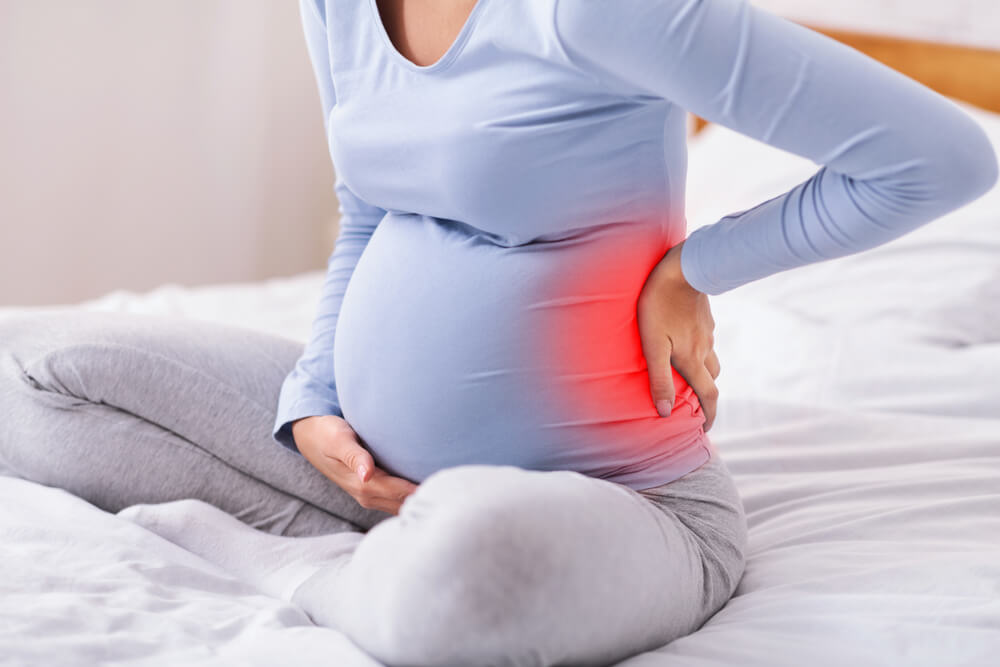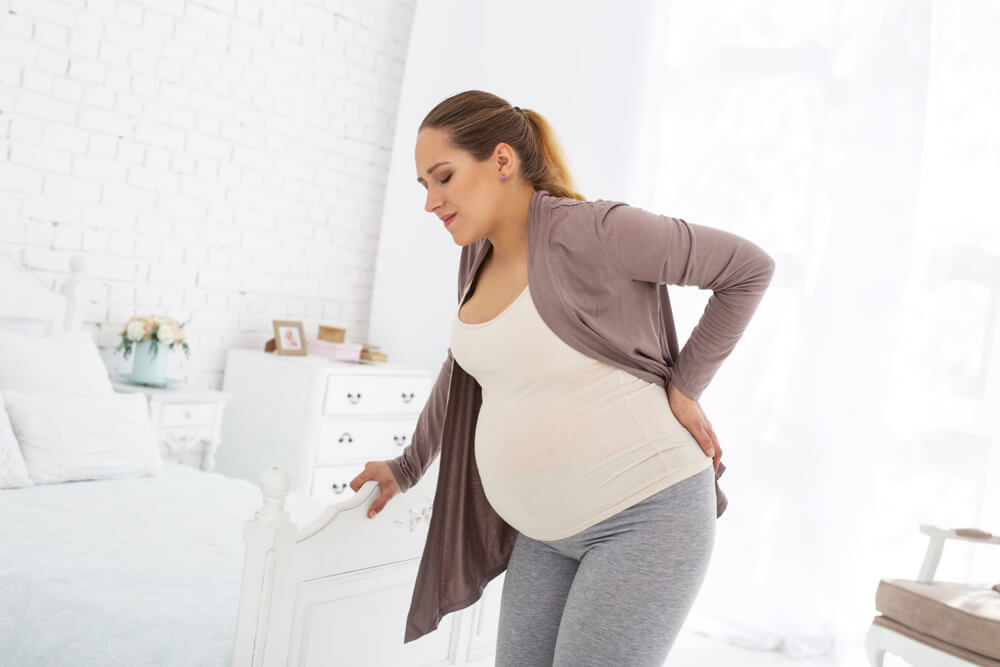Swollen feet, fatigue, morning sickness, nausea, cravings, and mood swings aren’t the only thing pregnant women may have to deal with during those nine months. Most of them will also experience mild to severe back pain during pregnancy, that, in most cases, will affect the lower back.
The expert team at University Park OBGYN knows that severe back pain during pregnancy can turn the otherwise exciting period pretty sour. That’s why, in this article, our experienced experts take a closer look at the leading causes of lower back pain in pregnancy and will discuss how to relieve severe back pain while pregnant.
About Back Pain During Pregnancy

As indicated by a review investigating this issue, over two-thirds of pregnant women experience low-back pain. Additionally, back discomfort can manifest in the middle of the back, termed lumbar pain by medical professionals, or in the tailbone area, referred to as posterior pelvic pain.
Multiple factors, such as hormonal shifts and changes in posture, play a role in the development of back pain during pregnancy. The specific causes can differ among women and may be influenced by the pregnancy’s stage.
Leading Causes of Lower Back Pain in Pregnancy
Before we discuss how to relieve severe back pain during pregnancy, we should mention the numerous factors that can lead to discomfort during the first trimester, second, and third trimester.
Hormonal Changes
One of the causes of back pain during pregnancy in the first trimester is an increase in progesterone. Higher levels of this hormone will relax the ligaments and the muscles around the pelvis, which can affect the stability of the back muscles and joint alignment.
Another hormone called relaxin also helps the egg implant into the wall of the uterus. This hormone also prevents early-stage contractions. Relaxin will, at one point, also affect the ligaments responsible for spine stabilization, which may cause low-back pain as a result of postural shifting and instability.
Increased Stress
While pregnancy is often considered one of the most exciting life events in a woman’s life, full of changes, it can also be a stressful experience as it will also come with several challenges. As we all know, stress doesn’t only affect our psychological state of being and mood. Stress can also trigger physical symptoms such as stiffness, headaches, fatigue, and muscle pain.
Leaning Backwards
When exploring the causes of severe back pain in pregnancy, the second and third trimesters will also hold a few changes.
At this time, the uterus will continue to expand, and the fetus will grow rapidly. As such, the woman’s center of gravity will also shift to the front as the fetus develops and grows. To regain balance, some women may lean back, which puts extra pressure on the muscles of the back. Needless to say, this may cause muscle stiffness and lower back pain.
Muscle Separation
The abdomen is made up of two parallel muscle bands that connect in the middle. The role of these muscles is to support the back and help stabilize the spine.
When a woman is pregnant, the developing baby will push against these muscles, often causing them to stretch and even separate. The pressure may lead to a condition referred to as diastasis recti.
That said, during the last two trimesters, some pregnant women may develop “pooches” or bulges in their stomach, which are obvious signs of the separation of the abdominal muscles, allowing more room for the growing baby. And as these muscles stretch, they also lose their strength, which can increase the risk of back injuries or developing pelvic or lower back pain.
Weight Gain
Gaining weight is also among the causes of lower back pain in pregnancy. The amount of weight a woman manages to put on during pregnancy won’t only impact her back pain but may have a negative effect on her and her baby’s overall health as well.
As such, the Centers for Disease and Prevention recommend that women who are carrying a single baby aim to gain the following amount of excess weight based on their weight before pregnancy:
- If underweight, around 28 to 40 pounds.
- If you have a healthy weight, around 25 to 35 pounds is ideal.
- If overweight, 15 to 25 pounds.
- If obese, 11 to 20 pounds.
How To Relieve Severe Back Pain During Pregnancy
Certainly, there will be times when it will seem that the pain simply won’t subside. Still, there are several ways women can get pregnancy back pain relief. Some of these strategies may help with pain management during and even after pregnancy.
As such, pregnancy back pain relief may come by giving the following methods a try:
- Using warm compresses to reduce inflammation and to relax tightened muscles.
- Stretching your lower back regularly.
- Getting adequate sleep.
- Try sleeping on one side with a pillow below your abdomen and between your legs.
- Making postural changes: sitting and standing upright, with square shoulders and a straight back.
- Using a maternity belt for extra back and abdominal support.
- Using lumbar pillows when sitting.
- Getting prenatal massages for muscle relaxation.
- Acupuncture and chiropractic services, specialized for pregnant women.
- Learning stress management techniques such as prenatal yoga, mindfulness, and meditation.
Avoiding and Preventing The Pain
Fortunately, there are also a few effective things you can do to avoid back pain during pregnancy in the first place. This includes the following:
- Doing pregnancy-friendly exercises to strengthen the back muscles.
- Maintaining a healthy weight while pregnant.
- Engaging in gentle, provider-approved exercise.
- Avoiding heavy lifting.
- Avoiding prolonged standing.
- Wearing low-heeled flat shoes with arch supports.
- Practicing good posture.
- Avoiding sleeping on your stomach.
- Use proper lifting techniques if necessary.
When Might You Need Help?
While back pain is regarded as normal during pregnancy, those women who are experiencing the following symptoms should contact their obstetrician or other experts as soon as possible:
- Persistent pain longer than two weeks.
- Severe pain.
- Regularly occurring and gradually intensifying cramps.
- Vaginal bleeding.
- Pain when urinating.
- Tingling sensation in your limbs.
- Irregular discharge from the vagina.
- Fever.
Sciatica and Pregnancy

Sciatica develops due to damage or irritation to the sciatic nerve. In the case of pregnancy, sciatica can emerge when the expanding fetus exerts pressure on this nerve.
A common manifestation of sciatica is the presence of lower back discomfort that extends from the buttocks down the leg.
If women experience persistent, severe back pain lasting more than two weeks, they should engage in a conversation with their healthcare provider to explore potential treatment approaches.
Pregnant women should consult their healthcare provider before initiating any new medications, supplements, or natural remedies.
Remain Calm
As mentioned above, back pain is a common problem during pregnancy, and several factors may trigger it. Still, the pain will typically resolve after giving birth. If not, and last for longer than two weeks, it should be examined by an expert.
On that note, if you are experiencing back pain during pregnancy and feel uneasy about it, you can always speak to us about your concerns. Schedule an appointment with us today; we are here to listen and help.


